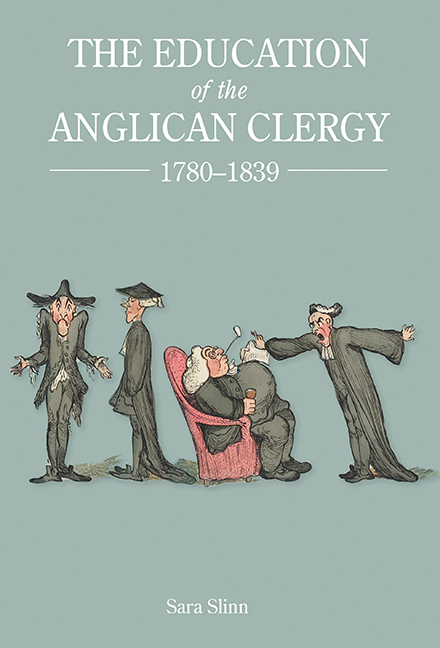Book contents
- Frontmatter
- Contents
- Illustrations
- Acknowledgements
- Abbreviations
- Introduction
- Part One Entrants to the Clerical Profession, 1780–1839
- Part Two Routes to Ordination
- Conclusion
- Appendix 1 Ordination Profiles of Bishops, 1780–1839
- Appendix 2 A Note on Methodology
- Bibliography
- Index
- Miscellaneous Endmatter
Appendix 2 - A Note on Methodology
Published online by Cambridge University Press: 30 August 2017
- Frontmatter
- Contents
- Illustrations
- Acknowledgements
- Abbreviations
- Introduction
- Part One Entrants to the Clerical Profession, 1780–1839
- Part Two Routes to Ordination
- Conclusion
- Appendix 1 Ordination Profiles of Bishops, 1780–1839
- Appendix 2 A Note on Methodology
- Bibliography
- Index
- Miscellaneous Endmatter
Summary
Gathering data
Names of ordinands
Names of ordinands to the diaconate, recorded in the Clergy of the Church of England database (CCEd), form the backbone of this study. This data has been confirmed, supplemented and extended using records that were not harvested by CCEd, the most significant being diocesan ordination papers (papers sent in by candidates as part of the application process for ordination) and lists of candidates expected for examination or ordination, drawn up by bishops’ secretaries and chaplains. Whilst such collections do not survive for every diocese, and for some survival is patchy, these records reveal the identity of ordinands omitted from CCEd, allow extension of the data up until 1839, and indicate ordinands who were ordained on letters dimissory (a matter about which the records drawn upon by CCEd are often uninformed). Since the existence of application papers does not necessarily indicate a successful ordination, no extra entries have been added without the evidence of future clerical function. Every effort has also been made to de-duplicate multiple applications for the diaconate, so that only the final, successful, ordination is counted. Certificates of ordination (issued to candidates) are sometimes found amongst parish, family and estate records; these have not been searched for exhaustively, but all those revealed by the online search portal Access-to-Archives, and by searches of online catalogues of county archives, have been incorporated.
Newspapers and periodicals, both regional and national, commonly printed lists of those ordained. A broad search of periodicals and newspapers has been made, and such lists have been used to check and supplement the other data. Comparing newspaper lists of the early 1830s to the data gathered by CCEd for the corresponding period, and comparing the newspaper lists against ordination papers for the post-1836 period, strongly suggests that collated periodical data is fairly comprehensive for the 1830s.
Educational status of ordinands
Having compiled a list of men ordained to the diaconate, details were added of university membership and educational qualifications held on ordination. Qualifications are often noted by CCEd, but for every man whose educational status was unrecorded or unclear, and for all those described as students or literates, educational status has been verified using the following sources: biographical registers of alumni, university and college calendars, clerical guides, obituaries and biographies.
- Type
- Chapter
- Information
- The Education of the Anglican Clergy, 1780–1839 , pp. 222 - 228Publisher: Boydell & BrewerPrint publication year: 2017



